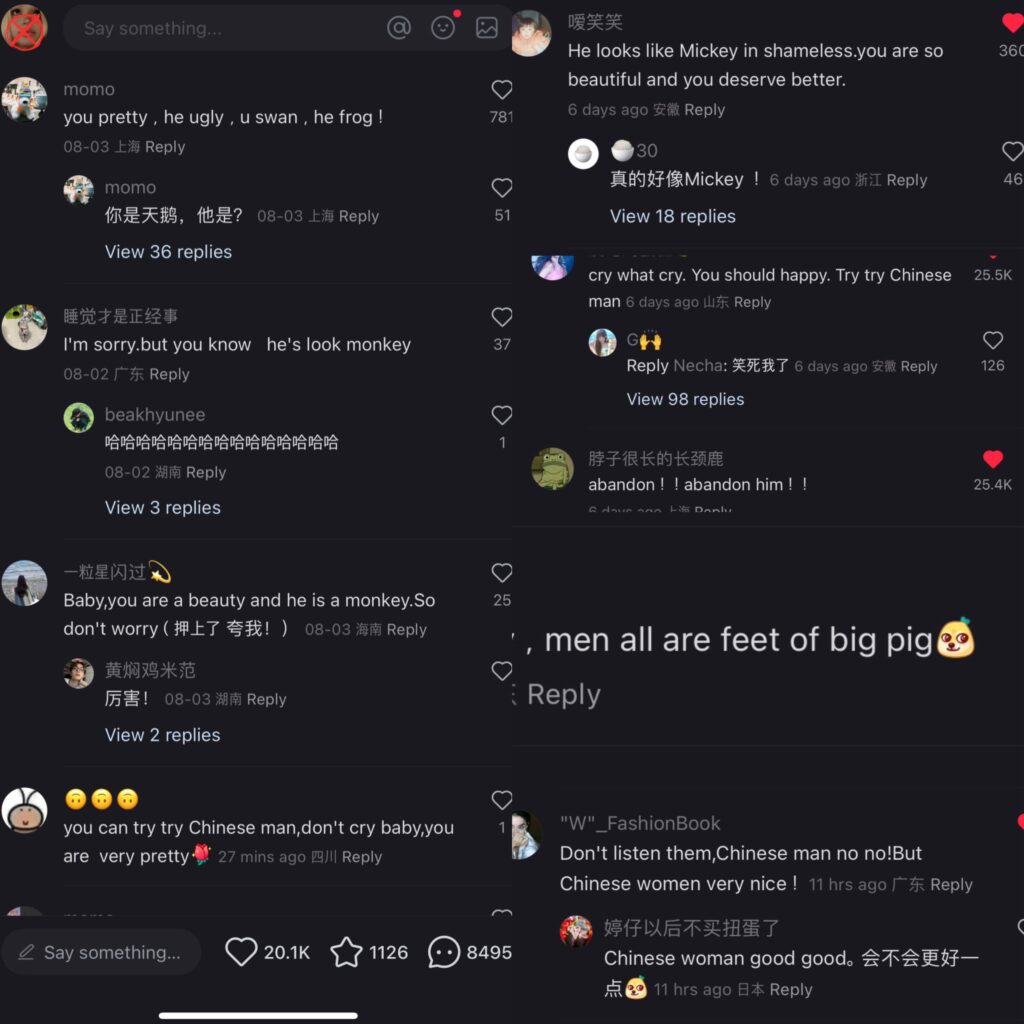Chinglish warms hearts on social media
“You swan, he frog” and “Cry, cry, cry what cry?” Confused? This isn’t a new episode of the old British show Mind Your Language, but the comment section of a Chinese social media post by a foreign blogger.
Earlier this month, the blogger Yourkris posted two pictures of a sentimental moment saying goodbye to her boyfriend who was leaving China. The post was made on her Xiaohongshu account. It is a popular lifestyle social media platform in China similar to Instagram.
Much to her surprise, the post was soon overrun by Chinese users sending consoling comments. Rather than posting in Chinese or English, many commenters opted for “Chinglish” – a mix of Chinese and English. These comments often result in humorous or awkward phrasing when traditional sayings get directly translated into English.
As of Aug 20, the post had garnered over 260,000 likes and 64,000 comments. Posts on X, formally known as Twitter, sharing the interactions have also gone viral. One has garnered over 325,000 likes since being posted.t
Imagine going through a rough patch with your boyfriend and thousands of Chinese netizens comfort you pic.twitter.com/fG7oa1bXKr
— kat ♱ (@albertcamslut) August 14, 2024
Outraged at her boyfriend leaving China, Chinese netizens offered the blogger the words of encouragement or comfort they deemed appropriate. Even if some comments are hard to understand, the message was clear.
Did she break up with her boyfriend? Then it was “Old no go, new no come”. One user attempted to express an ancient Chinese saying advising her to leave the past behind and look forward.
Did her boyfriend break her heart? Then it was commentators encouraging Yourkris that she deserves someone better. Many offered advice recommending Chinese men – “try try Chinese”.
A commentator trying to encourage Yourkris opted for “Cry what cry”. A simplified translation of a Chinese expression meaning “snap out of it.”
The departing boyfriend faced a lot of vitriol, often targeting his looks. “You swan, he frog” posted one while another commentator bid “men are all feet of big pig”.
One of the most popular phases under the post played on a Chinese saying — a toad wishing to eat swan meat — that describes a craving for something that one is unworthy of. “You pretty, he ugly, u swan, he frog,” read the comment. This comment has gone viral on its own. Many female netizens opting to post the metaphor of “You pretty, he ugly, u swan, he frog” as caption and comments on pictures across X and other social media.
you pretty he ugly you swan he frog https://t.co/DEtl37FH0Z
— 6len ʚїɞ (@6len0022) August 15, 2024
These comments are mostly literal translations of Chinese sayings or expressions. They amazed and amused English speakers after photos of the comments were posted on X.
Some X users began discussing the use of the word “abandon” in some of the comments, with many thinking that urging the young woman to “abandon” her boyfriend was far more impactful than advising just to “leave” him.
Some Chinese idioms or expressions are not unknown to the English-speaking world when translated directly. Take “Long time no see” as an example. The expression is a literal translation of a Chinese exclamation used by people who haven’t seen one another for some time, and it has long been a widely used phrase in everyday English. As the above comments show, many don’t translate quite so well.

Despite its ubiquity, Chinglish used to be embarrassing for many Chinese people learning English. So much so that even today, many Chinese learners still spend considerable time trying to master the most elusive details of English grammar to seem like native speakers.
But among younger a generations of netizens growing up amid the growing global influence of Chinese culture, the idea of “language-shaming” seems to be fading. As Chinglish phrases like “Add oil” are being included in the Oxford English Dictionary, it is understandable that speaking like a native no longer seems so important.
Returning to the Yourkris comment section, people can assume that many of these Chinese netizens speak English far better than their comments would suggest. However, instead of crafting grammatically impeccable sentences, it seems they chose to console the blogger with Chinese wisdom in its crudest and most literal translated form. Chinglish.
To them, Chinglish is more of an amusement than an embarrassment. Judging by the viral and ongoing popularity of their comments, they are right.
Written by Yi Shen, additional reporting by Xinhua and Ecns.cn.
If you liked this article, why not read: ‘Black Myth: Wukong’: an interactive adventure in Chinese culture














